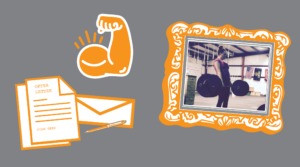When I was 27, I started powerlifting for the first time (too lazy for cardio) and quickly became besotted with the idea of deadlifting 300 pounds. So, I eagerly approached my coach and asked, “What’s the secret to lifting 300 pounds?”
“The secret?”
“Yeah, I have seen women lift 300 pounds and it looks awesome! I would love to be able to do that. What do they do? Is it those gummy bears they eat in the middle of a training session?”
“What?”
“Oh, I know. I bet they visualize themselves successfully completing the lift… I have heard visualization really works!”
After recovering from laughing, my coach replied, “There is no secret to lifting 300 pounds.”
“So they’re just genetically gifted?”
“No. No one just comes in and lifts 300 pounds. Any woman who can do that has lifted consistently day in and day out every single week for years. It’s just about consistency, repetition, failure, and putting the work in. In fact, pretty much all of life works like that. There is no secret to anything.”
Oh man, I had really hoped it was the gummy bears.
So I took my coach’s advice and never missed a training session. And about four years later, I stood up holding 300 pounds in my hands.
It was a proud moment for this decidedly mediocre athlete but the bigger takeaway was my wise coach’s greater message, which I have found transcends well beyond lifting weights: “there is no secret to anything.”
As this is a Talent Market article, what is the getting a job equivalent to my coach’s amazing advice? Here are my four key takeaways.
1. Show up.
I showed up to the gym consistently three times a week for four years, even and especially when I didn’t feel like it, before I was able to reach my 300-pound goal.
For the job search, showing up means crafting a great application and officially applying.
The desire to find a shortcut instead of putting forth the effort to craft a strong application is real. I understand why. (Oh, if only the gummy bears did the trick!) Tailoring your resume and writing a strong cover letter takes time. It’s much easier to just reach out to someone you know at the organization to circumvent the application process and get an interview or submit the same generic application that you submitted to five other jobs in the last month. Resist the pull of those shortcuts and put all of that effort into crafting the best application materials you can.
2. If you know something is off, address it.
About 20% of the time, a lifting session feels terrible for no reason. The moment I pick up the barbell, it’s clear that I just have nothing in the tank. But, more often than not, there is a reason and I know exactly what it is. I slept five hours the night before, I have opted for pizza over healthy protein a little too frequently lately, or I slammed Old Fashioneds last night like I was single-handedly trying to keep the whiskey industry afloat.
I always feel embarrassed when I lift poorly because of my own bad decisions and a big part of me wants to hide it from my coach. But I never do because I know the only way she can help me train appropriately is if I am honest upfront.
This is also true in the job search! If you ever decline to mention something in your cover letter because you worry it will make you look bad or raise questions, that probably means you desperately need to address the elephant in the room head-on!
What are some examples of elephants in the room that need addressing?
· If you are applying for a job that is on the surface unrelated to your current line of work. For instance, if you have never fundraised a day in your life but you are applying for a fundraising job, you better say why! I once had a candidate apply for a fundraising job who didn’t have a lick of development experience. His cover letter didn’t even mention the large, gray pachyderm we all saw. The hiring manager was very confused, and even though she was open to hiring someone without direct experience, the lack of an explanation for such a transition left her uneasy. Well, it turns out the candidate had been extremely thoughtful about the transition, reading every fundraising book under the sun and talking to tons of fundraisers to get their advice and expertise. But for some reason he didn’t put any of this in his cover letter! The same goes for any big career transition. Address it up front!
· If you were only with your previous employer for a short period, the hiring manager is going to wonder why. If you address the reason in your cover letter, you are putting that question to rest immediately. There are tons of perfectly benign reasons why jobs don’t work out. Maybe you liked the work but it wasn’t a good culture fit. Or maybe the employer went through a round of layoffs. If you state the reason upfront, the hiring manager won’t be left to worry that you got canned for insubordination or binge-watching Netflix during working hours.
3. Do exactly what is asked of you.
Sometimes a lifting session feels unnaturally great for no reason. On these days, there is a strong temptation to ignore what my coach told me to do and try to max out. Why lift 250 pounds when I know I can hit 275, baby? Because, odds are, the next day isn’t going to be a superman day and I will feel fatigued and ruin my training for the week.
My coach is an expert and she told me exactly what to lift. So I just stick to that.
With job searching, just do what the employer tells you to do. If they want a resume and cover letter, submit a resume and cover letter. Don’t send writing samples, letters of recommendation, the article you got published in the Wall Street Journal, a headshot, or a screenshot proving that you actually scored Taylor Swift tickets.
An employer knows what they want to see from candidates and they do not hide it. So just give them what they want!
4. Expect to fail.
In lifting and in job searching, failure happens frequently. In fact, if I go months without failing a lift, then it is a fact that I am simply not training hard enough. Failure is a prerequisite for success.
Most of the time, when you apply for a job, you will not get it. Even if you have every single qualification listed in the job description, are close friends with tons of people who work there, and love freedom so much that fireworks spontaneously burst forth from your fingertips every Fourth of July, there are a million reasons why you might not land the job. Don’t let it get you down.
Pick up that barbell…er job application…and keep trying.
(To reiterate, this article was written by Katelynn Barbosa and NOT Claire Dixon. Claire would only consider lifting this much weight if an oak tree fell on her dog.)





